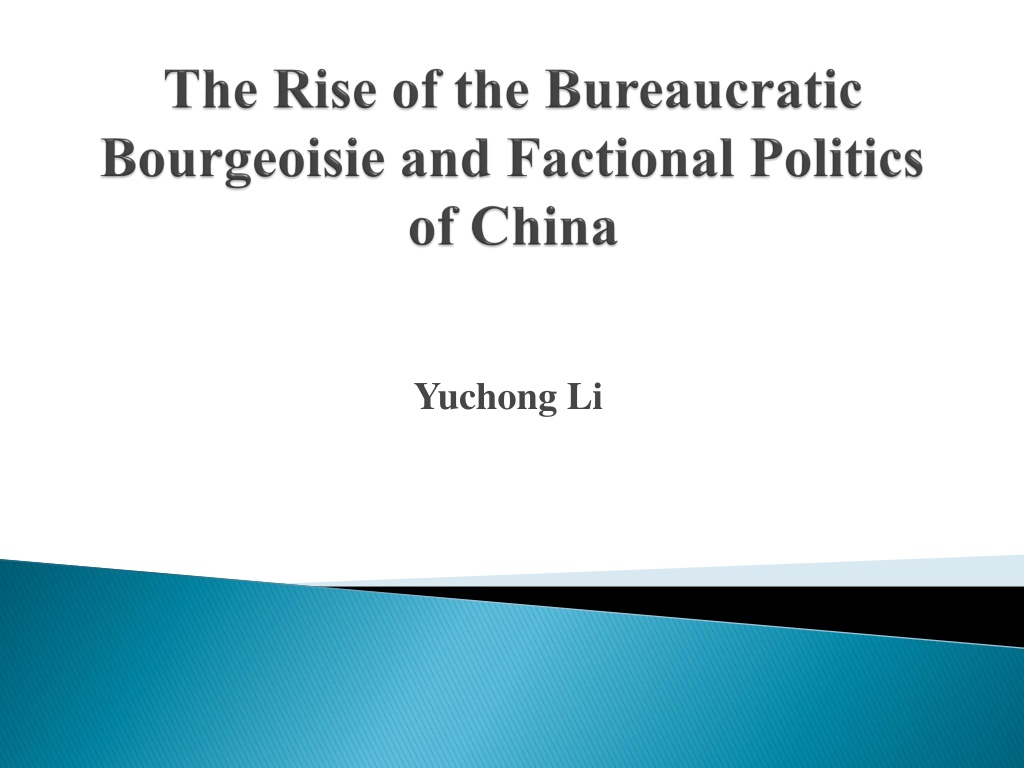Understanding China's Bureaucratic Capitalism and State-Directed Economy
China's approach to capitalism under Deng's reform embodies state-directed capitalism, characterized by central control over economic reforms while maintaining a non-democratic political system. This model has led to the rise of a bureaucratic capitalist regime with state-backed companies dominating the stock market. Supporters argue it provides stability, but critics point to inefficiencies and talent drain. The relationship between political power and economic gain is evident in examples of bureaucratic families seizing control of state corporations, mirroring historical models like the East India Company.
Download Presentation

Please find below an Image/Link to download the presentation.
The content on the website is provided AS IS for your information and personal use only. It may not be sold, licensed, or shared on other websites without obtaining consent from the author. Download presentation by click this link. If you encounter any issues during the download, it is possible that the publisher has removed the file from their server.
E N D
Presentation Transcript
Chinas rise towards capitalism has been guided by the cautious reform approach set by Deng (1904-97). The principles: Economic reforms does not mean a democratic political system. Western model of power sharing not to be followed. Every major reform needs permission from Government. Resulted in rent capitalism with major beneficiaries as state bureaucrats
Key state organizations set up to deal with foreign companies. Allows rise of bureaucratic capitalist regime ,with bureaucrats' family members holding top positions in these firms. Unconnected firms vanished due to bureaucratic hurdles.
Many examples to show bureaucratic families seizing control of state corporations. Jiang Mianheng: Director, Shanghai Alliance Investment Ltd. (SAIL). Li Xiaopeng:General manager and board chairman, Huaneng International Hu Haifeng:Party Secretary ,Tsinghua Holdings
State-directed capitalism is not a new idea: witness the East India Company. State-backed companies account for 80% of the value of China's stockmarket . China sees state capitalism as a sustainable model for beating West.
State capitalism's supporters argue that it can provide stability as well as growth. Example: So Lee Kuan Yew's government in Singapore. When the government favors one lot of companies, the others suffer. Studies show that state companies use capital less efficiently than private ones, and soak up young talent.
Bureaucratic capitalism, a term that refers to the use of political power and official influence for private pecuniary gain through capitalistic or quasi-capitalist methods of economic activity.
The previous slide shows a graph between USSR and China(real GDP) If we observe that both countries following the policy of state capitalism While China continued in its rise ,same cannot be said about Russia/USSR. The following observations can be made: Presence of strong authority is necessary for success. With a despotic state in its hands, the Chinese bureaucracy is more than capable of containing the economic cycle.
State firms must be outward looking. Eager to trade with outside world. Chinese firms grab contracts around the world. Having established a culture where company s baton is passed within the family, has reduced instability when power vacuum is created.
Such a concentrated and linked nature of political institutions and economic opportunities motivates the use of public office for private gain. As more and more market sectors are penetrated by the coalition-specific bureaucratic bourgeoisie, economic measures have started being used as political tools. This can impact CCP selection process in a big way.
The Rise of the Bureaucratic Bourgeoisie and Factional Politics of China by WING-CHUNG HO http://socialistresistance.org/china-bureaucratic- capitalist/4188 http://www.europe-solidaire.org/spip.php?article35764 The rise of state capitalism by Economist The Rise of the Working Class and the Future of the Chinese Revolution by Minqi Li

